«
vissza a Terebess Online nyitólapjára
«
vissza a Terebess Center oldalra
Slitfilm
A film by Sándor Kardos
(2005)

Sándor Kardos
photographed with a slitcamera
”Since
I’ve been involved in film-making it has always bothered me that images in films
are too concrete
and as such they ignite the imagination but do not let it
soar.
The image seen in the target of a film camera never exists in that particular
form in real life.
Thus, contrary to traditional means of recording images
it isn’t designed to create the illusion of reality.
In this film an attempt
is made to tell a story using a means that has nothing to do with real experience.”
Sándor Kardos on 'Slitfilm'
'Slitfilm' (19’)
Hungarian title: 'Résfilm'
short fiction, 35 mm, cinemascope colour, DolbySR
Director Sándor Kardos
Script Sándor Kardos (adapted from "The Handkerchief" by Akutagawa Ryunosuke)
Photography Sándor Kardos
Editing Péter Politzer
Cast Nakagami Hisato, Yamada Ayaka, Sámson Kardos, Abigél Balogh
Production Inforg Stúdió
Distribution Magyar Filmunió"Slitfilm" was photographed with a slitcamera, and awarded Grand Prize of the Experimental Film Category at the 36th Hungarian Film Week in February, 2005, for the non-illustrative, but visual adaptation of the literary material, the astounding technical solution and the power of the peculiar film expression; and the film was given the Best Experimental Film Prize at “The Golden Eye Cinematographer Festival”, 2005.
Sándor KARDOS Born in Budapest in 1944. Graduated in Hungarian literature/linguistics and cultural management from the ELTE University, then in cinematography from the Hungarian Academy of Drama and Film. Since 1979 he has been working as a cinematographer for the Hungarian Film Production Company (MAFILM) and as a director and DOP for the Hungarian National Television (MTV). He has worked with great Hungarian directors like András Jeles, Géza Bereményi, Péter Tímár. He directed his first full-length feature film Winning Ticket/Telitalálat with Illés Szabó in 2003. His short film Slitfilm/Résfilm made in 2005.
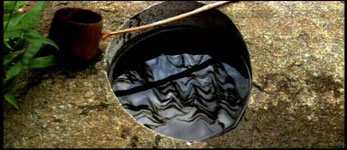
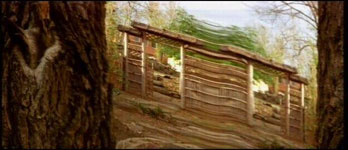
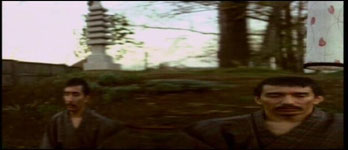
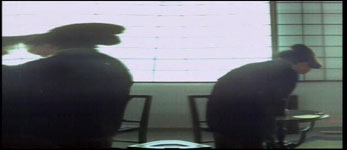
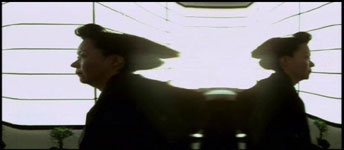
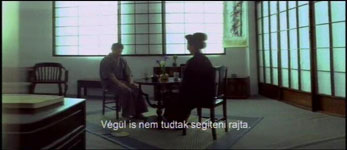
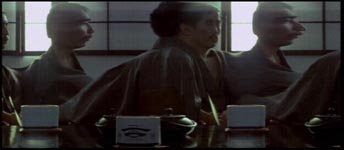
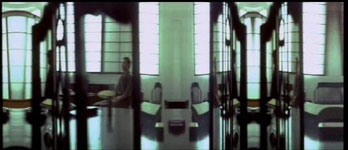
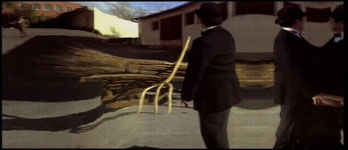
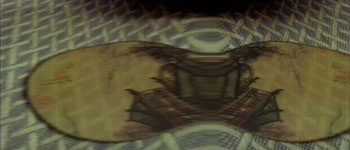
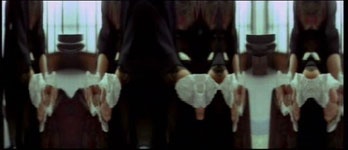
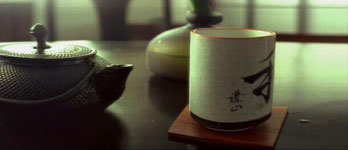
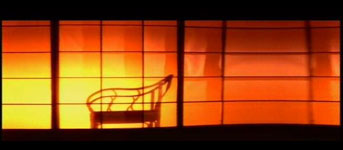
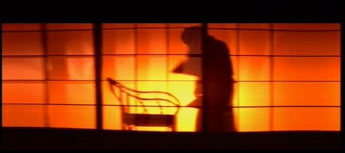
The film is an adaptation of Akutagawa Ryunosuke's short story, "The Handkerchief".
Complete online text of the short story in Japanese: "Hankechi", 1916.
Its English translation ("The Handkerchief") is reproduced here verbatim:
--Akutagawa Ryunosuke (1892-1927), "The Handkerchief"
Professor Hasegawa Kinzo of the Law School of Tokyo Imperial University was sitting in a rattan chair on the veranda, reading Strindberg's Dramaturgy.
His specialty was the study of colonial policy. Consequently, the fact that he was reading Dramaturgy might be something of a surprise to the reader. But, as might be expected of a professor who was no less famous as an educator than as a scholar, when leisure permitted, he made a point of reading through any books which were concerned with the thoughts or sentiments of the students of the time, even if such works were out of line with his special study. Actually, he had taken the trouble to read Oscar Wilde's De Profundis and Intentions merely for the reason that they were favorite books among the students of a certain college with which he was associated as principal. That being so, it was not strange that the book he happened to be reading was a discourse on modern European drama and actors. For among the students under instruction, there were not only some who wrote critiques on Ibsen and Strindberg, or Maeterlinck, but also some enthusiasts who wished to follow in the steps of such modern dramatists and make playwriting their life's work.
As the Professor finished reading each aphoristic chapter, he put the yellow clothbound book on his lap and glanced vacantly towards the Gifu lantern hanging on the veranda. Oddly, no sooner would he do so than his thoughts would depart from Strindberg. Instead, thoughts of his wife, with whom he had gone to buy the lantern, would come into his mind. The Professor, while studying abroad, had married in America; so, his wife was, as you might suspect, an American. But she loved Japan and the Japanese hardly less than he did. Especially was she an admirer of the finely wrought objects of Japanese arts-and-crafts. Accordingly, it was safe to surmise that the Gifu lantern, suspended on the veranda, did not so much represent the Professor's taste but rather was an expression of his wife's enjoyment of the things of Japan . . .
Whenever he put down his book, the Professor thought of his wife and the Gifu lantern and Japanese civilization as represented by that paper lantern. According to his convictions, in the past fifty years Japanese civilization has shown remarkable progress on the material side; but spiritually, it had not made any appreciable progress that was readily discernible; no, rather, in one sense there had been a decline. Therefore, it was the urgent duty of the thinkers of the day to consider what had best be done to remedy this decline. It was the Professor's contention that there was no other recourse but to depend upon the Japanese heritage of bushido. Bushido ought never to be looked upon as simply the moral code of a narrow-minded insular people. On the contrary, its essence might well be identified with the Christian spirit of the peoples of Europe and America. If this bushido could be revived in the existing current of Japanese thought, it would not only revitalize the spirit of Japanese civilization, but it would be advantageous in facilitating mutual understanding between the European-American peoples and the Japanese people. Or, it would be a means of advancing international peace. -- He himself had long dreamed of becoming such a bridge spanning East and West. To such a Professor, his awareness that his wife and the lantern - and the Japanese civilization as represented by that lantern - preserved a certain harmony, was ever a pleasant thought.
Then - in his repeated enjoyment of such satisfaction, the Professor gradually noticed that even while he was reading, his concentration continually strayed from Strindberg. A little vexed at this, shaking his head he again began to pore painstakingly over the small type. Thereupon, just where he took up his reading again, the following was written:
When an actor discovers an appropriate mode of expression for the most ordinary emotion and wins success through this means, then, without due consideration as to its suitability or unsuitability to the occasion,he may - on the one hand because it is facile, and on the other hand because of his success with it - be prone to employ this device. And this is what may be termed a mannerism.
The Professor had felt that with art - and especially drama - he had no natural affinity. Even the Japanese theatre he had attended only a few times in his life. Once in a story written by a certain student the name Baiko had been mentioned. The Professor, proud as he was of his encyclopaedic knowledge, had to admit that this name was unfamiliar to him. When it was opportune, he called the student aside and asked him what the name, Baiko, represented.
"-Baiko? Baiko is an actor attached to the Imperial Theatre at Maru-no-uchi; he is currently playing the female role of Misao in the Taikoki Judanme [a Kabuki play; all roles are played by men]."
The student, who wore a Kokura hakama skirt, [distinctive traditional dress of samurai and other well-born men], courteously had replied in that way.
. . . The Professor held no opinions whatsoever as to the pertinent criticisms raised by Strindberg. A vague interest was aroused only to the extent to which the comments evoked in his mind an association with the dramas he had seen in the West during his studies abroad. He was, in a way, not much different from the middle-school teacher of English who reads Bernard Shaw's plays in his search for idioms. But an interest - whatsoever its bent - is still an interest.
The Gifu lantern hanging from the veranda ceiling was still unlit; and, in the rattan chair Prof. Hasegawa Kinzo was reading Strindberg's Dramaturgy. This is all I need write for the reader to imagine what a long afternoon in early summer it was. But this does not imply that the Professor was afflicted with a sense of boredom. If a person were to interpret it that way, he would be deliberately and cynically misconstruing what I write. - As it happened, he had to give up reading Strindberg for the time being. This innocent amusement of the Professor's was interrupted by the maid's announcement of a guest. Howsoever long the day, the Professor would never cease to be burdened by life's obligations.
Putting down the book, the Professor glanced at the visiting card that the maid had just brought to him. On the ivory paper in small type was printed Nishiyama Atsuko. He could not remember having met such a person. Even so, the widely connected Professor, as he got up from the rattan chair, turned over in his mind the names of his acquaintances. But still he could not recall a face associated with that name. Then, in lieu of a bookmark, he placed the card in the book which he left on the rattan chair, restlessly adjusted the front of his unlined raw-silk kimono, and again glanced up at the fancy lantern before his nose. It would be so with anyone, in such circumstances, that the host who is obliged to keep a guest waiting is more impatient than the waiting guest. Moreover, it is not necessary to add the explanation that, as the Professor was punctilious in all his affairs, this would have been the case at any time - not only on that day when the caller was an unknown woman.
At last, calculating the proper moment, the Professor opened the sitting room door. A lady of about forty years of age, who had been sitting on a chair, stood up almost at the same time as he entered the room. The guest was elegant beyond the Professor's powers of discernment; her unlined blue-grey kimono was of fine quality, and the black gauze haori coat [traditional jacket] was slightly opened in the front to reveal a jade green clasp with an embossed diamond-shaped dedsign. Her hair was dressed in marumage style as worn by married women [a style involving a high bun]; even this detail was noted by the usually apathetic Professor. An intelligent and motherly lady, she had the round face and amber complexion typical of the Japanese. The Professor, after one look at his guest's face, felt he had seen her somewhere before.
--I am Hasegawa.
The Professor greeted her cordially. If they had previously met, he thought that she would be thus prompted to offer some explanation of her presence.
--I am the mother of Nishiyama Kenichiro.
Having introduced herself in a clear voice, the woman politely returned his greeting.
At mention of the name, Nishiyama Kenichiro, the Professor remembered he was one of the students who had written essays on Ibsen and Strindberg. His specialty had been German Law, the Professor believed, but upon entering university he had taken an interest in philosophy and had often come to the Professor with his problems. Then, that spring, he had had an attack of peritonitis and had been admitted to the university hospital. The Professor forthwith had visited him once or twice. It was not without good reason that he had thought he had seen the lady's face somewhere. With those heavy eyebrows, that spirited youth and this woman - as the popular Japanese saying goes -- were as like in appearance as two melons -- so astonishingly alike were they.
--Ah, Nishiyama . . . Oh, yes.
Nodding to himself, the Professor pointed to a chair on the far side of the small table.
--Then, would you please sit down.
Having excused herself for her sudden visit, and having bowed politely, she sat down in the chair which he had indicated. At that moment, from her sleeve she took out something white - possibly a handkerchief. The Professor, having noticed this, quickly pushed forward a round Korean fan that was on the table, then sat down in the chair opposite.
--You have a fine home!
The lady deliberately cast her eyes around the room.
--No - it's large enough - but we don't give it very much attention.
Here, the Professor, who was accustomed to this sort of greeting, pressed her to take the iced tea which the maid had brought in, and soon directed the conversation towards her.
Nishiyama - how is he? - Is there no marked change in his condition?
Well . . .
The lady, modestly crossing both hands on her knees, paused a little, then spoke quietly in a caressing, self-possessed tone.
Actually, I came today to talk to you about my son. - In the end, all was useless. While he was alive he caused you much bother . . .
The Professor had judged that reserve prevented his guest from taking her tea and was just about to take a sip of the black tea himself. Not wishing to be indiscreet in bluntly pressing her, he had deemed it the wiser course to be the first to drink. But the cup had not yet reached his soft moustache when the lady's words suddenly assailed his ears. Should he drink the tea? - or should he not? - such conjecture had for the moment thrust the fact of the youth's death from the forefront of his mind. Certainly he could not hold the teacup in mid-air. Thereupon, the Professor resolutely gulped down half the tea in the cup; and then, with brows knit, he made a stifled exclamation of dismay.
--Even while in the hospital, he often spoke of you, and though I know you must be very busy, I thought I would tell you what had happened and, at the same time, pay my respects . . .
--That's very kind.
The Professor spoke despondently as he set down his teacup and picked up the blue waxed fan.
--So, nothing could be done? Just at the age when he was about to launch out; but, as I had heard no news from the hospital, I even thought that by now he would have almost recovered. - Then, when did it happen? - his death?
--Just a week ago yesterday.
--At the hospital?
--That's so.
--Well, really it's most unexpected.
--Anyhow, everything was done for him that could be done, so there is nothing to do but to reconcile oneself. - Even so, having brought him up thus far, I cannot help but complain when I think of what might have been.
During this interchange, the Professor noticed something extraordinary. In this woman's attitude, in her behavior, there was nothing in the least to suggest that she was talking of the death of her own son. There were no tears in her eyes. She spoke in a normal voice. And, moreover, there was a fleeting smile at the corners of her mouth. Anyone, without hearing her conversation, who might have seen her external appearance, would certainly have thought that this woman was talking of mundane household matters. All this seemed very strange to the Professor.
. . . During the Professor's student days in Berlin long ago, Wilhelm I, father of the Kaiser, had died. The Professor had happened to be in his favorite coffee shop when he heard the report of the royal demise, and at the time it made no extraordinary impression on him. He wore his usual expression of well-being as, his cane under his arm, he returned to his lodgings. But no sooner had he opened the door than the two children from the boardinghouse fell upon him and burst into a flood of tears. One, a girl of twelve, wore a brown jacket, and the other, a boy of nine, was in dark blue short trousers. The Professor, who was fond of children, had no idea of what could be wrong and, stroking the fair hair of the two, eagerly tried to console them.
--What's the matter? -- he asked.
The children did not stop crying. And, sniffling, they said:
--Our grandfather, the Emperor, is dead!
The Professor marvelled that the death of the Sovereign of a country should bring so much grief to children.
It prompted him to consider problems beyond those associated with the Palace and its people. Since coming to the West, he had many times been distressed by the impulsive Westerners' emotional outbursts which, as at this time, had been a source of astonishment to him who, being Japanese, was a believer in bushido. The suspicion and sympathy he had expressed at that time, he had never forgotten and never could. Even as he had thought the previous situation strange, so now the Professor wondered at this converse situation - a lady who did not weep.
But, this first discovery was immediately followed by a second discovery . . .
Just then, the conversation of host and guest, having branched forth from reminiscences of the deceased youth to details of his daily life, was once more about to return to the former reminiscences. By some chance, the Korean fan slipped from the Professor's hand and dropped onto the mosaic floor. The tempo of the conversation was leisurely enough to permit momentary lapses. So, the Professor bent forward in his chair and stretched out an arm towards the floor. The fan had fallen under the small table close to the lady's white tabi [traditional two-toed socks] which were concealed in her slippers.
The Professor's eyes then happened to glimpse the hands which, clasping the handkerchief, rested on her knees. Of course, this alone was no revelation. But the Professor had also noticed that the lady's hands were trembling violently. He had noticed that, in her struggle to suppress her agitated feelings, she was grasping her handkerchief so tightly in her trembling hands as almost to tear it. And, finally, the embroidered edge of the crinkled silk handkerchief moved between her supple fingers, as if stirred by a gentle breeze. Assuredly, the lady had a smile on her face, but, in fact, all the while she had been weeping with her whole body.
The Professor's face as he raised himself after picking up the fan wore an expression which had not previously been there. With the feeling of awe at having seen something which he ought not to have seen, came the consciousness of a certain satisfaction; but this, too, was accompanied by an immense complexity - its manifestation more or less dramatically exaggerted.
--Then, I well understand your grief, even though I myself have no children.
The Professor, as though he had seen something radiant, had said those words with a slightly exaggerated inclination of his head, speaking in a lowered, emotionally imbued voice.
--Thank you . . . But now, whatsoever we may say, as we cannot have him back . . .
The lady bent her head a shade. Over her face, serene and unchanged, spread an abundant smile.
* * * * * *
Two hours later, the Professor, having had his bath and finished his dinner, was picking at some cherries as he sat in the rattan chair on the veranda.
The long summer evening still diffused a thin light; the glass doors of the wide veranda remained open; there was no sign of darkness yet. In the faint light the Professor sat on, his legs crossed, his head resting on the back of the rattan chair, and stared dreamily at the red tassel of the fancy Gifu paper lantern. He seemed not to have read even one more page of the Strindberg he held in his hand. And, it was bound thus to be so. Mme. Nishiyama Atsuko's admirable behavior still filled the Professor's head.
Over dinner the Professor had related the whole story to his wife. And he extolled the bushido of Japanese women. His wife who loved Japan and the Japanese had listened with a sympathetic ear. The Professor had thought it satisfying that his wife had proven such a fervent listener. His wife, his recent visitor, and the Gifu paper lantern - these three - having taken on a certain ethical setting, loomed in the Professor's consciousness.
The Professor did not know how long he had been absorbed in such pleasing reflections when he happened to recall that he had been pressed to contribute an article to a certain magazine. The magazine was soliciting distinguished authorities from various fields to write their general opinions on morality for a column, "Notes on Modern Youth." He would use this day's incident for the article; he would send on his impressions right away, thought the Professor, scratching his head a little.
The hand that scratched his head still held the book. Until then, the Professor had taken no interest in that book, but he now opened and gazed at the page he had been reading before, where he had placed the card as a marker.
Just then, the maid came in and lit the lantern, so even the small type was not particularly troublesome to read. The Professor, without any real interest, let his eyes fall aimlessly over the page; Strindberg had written:
When I was young, I heard a report which probably originated in Paris, concerning one Frau Heiberg. While she smiled, she would tear a handkerchief in two - a dual performance. - We now call it mätzchen (slapstick; bad acting) . . .
The Professor laid the book on his knees. Nishiyama Atsuko's card was still between the open pages. But the lady was no longer in his mind. Nor was his wife in his mind, nor the Japanese civilization. Rather was it something indefinable which jeopardized the peaceful harmony of his soul. The performance which Strindberg disdained and the problem of practical ethics were, of course, different. But among the insinuations present in what he read, there was something which ruffled the Professor's mood of complacence which he had had since he had stepped out of the bath . . . Bushido and its mannerisms.
The Professor, as though from discontent, shook his head two or three times; then, casting his eyes upwards, once more he began to look intently at the bright Gifu lantern on which were painted autumn grasses.
Background Notes
"The Handkerchief" is written in a
straightforward realist style.
It's important to remember that handkerchiefs
are not part of traditional Japanese attire;
they - like the tables and chairs in the
protagonist's house - are Western
accoutrements. The 'opening' of Japan
to the West (beginning in 1868)
was accompanied by Japanese imitation
of European and American dress, architecture,
educational practices, even military organization.
It also inaugurated the importation of loan words
from European languages, 'hankechi' being one.
The 'bushido' frequently mentioned in this story
is the 'way of the warrior', roughly equivalent to
what we think of as the 'samurai code'.
An upper-class philosophy, bushido involves
restraint, skill, self-sacrifice, and loyalty.Other notes: Strindberg, Shaw, Ibsen, and
Maeterlinck are contemporary (to Akutagawa)
European playwrights;Oscar Wilde is a modern (to Akutagawa)
and controversial Irish writer;Tokyo University was and still is the premier
institution of higher learning in Japan;a Gifu lantern is a fancy painted paper lantern,
popular with tourists and rarely used
in private Japanese homes.- - -
Nitobe Inazo, who served as under
secretary general of the League of
Nations for seven years, wrote Bushido:
The Soul of Japan in English. This book
was issued in 1899 and the word
"Bushido" means the code of warriors.
Nitobe explains as follows in Bushido:
The Soul of Japan: "The transformation
of Japan is a fact patent to the world.
Into a work of such magnitude various
motives naturally entered; but if one
were to name the principal, one would
not hesitate to name Bushido. When we
opened the whole country to foreign
trade, when we introduced the latest
improvements in every department of
life, when we began to study Western
politics and sciences, our guiding
motive was not the development of our
physical resources and the increase of
wealth; much less was it a blind
imitation of Western customs."He was certainly among ideal Japanese
warriors whom Toson admired. He died
in Canada after he attended an
international conference.
A story entitled "Handkerchief"
was written by Akutagawa Ryunosuke.
It is said that Professor Hasegawa, a
character in "Handkerchief" was
modeled on Nitobe Inazo. Hasegawa is
worried about Japan's mental depravity
and he believes that the only thing to
save this corrupted society is Bushido.
For him Bushido is not a narrow-minded
morality of an island country but it in a
sense is similar to Christianity in
Europe.Although Hasegawa majors in
colonial policy he tries to skim through
books concerned with students' thinking
or feeling. On a summer afternoon he
was reading Strindberg's dramaturgy.
According to the book, after an actor
finds out a way of expressing common
emotions, he is likely to rely upon the
technique and it becomes a form or
"Manier."Then a student's mother comes to
his house to tell him that the student,
who was in hospital, is dead. She speaks
about the son's death quite calmly even
smiling a little. Hasegawa, however,
notices that her hands are trembling and
she holds a handkerchief tightly as if she
were tearing it. This behavior seems to
him a Japanese woman's Bushido.
But later on the same day, he finds
in the dramaturgy a comment on a lady
who tears a handkerchief in half with a
smile on her face. Strindberg regards
this as a double performance and calls it
"Mätzchen", which is theatricality.
Akutagawa was well-read in
Japanese, Chinese and European
literature. Through this story, he perhaps
wished to hint that Bushido and
Japanese tradition in general would not
be properly understood by the
Westerners. He killed himself when he
was thirty-five years old, leaving a note
which said that the reason for his suicide
was just some vague uneasiness. His
anxiety might have partially grown out
of the crucial cultural gap between Japan
and the West.- - -
"The Handkerchief" was, in fact, inspired
from Lafcadio Hearn's The Japanese Smile
("Glimpses of an Unfamiliar Japan, 2",
Chapter Eleven):"At this moment there comes to me the
recollection of a queer story told by a
lady of Yokohama about one of her Japanese
servants. 'My Japanese nurse came to me
the other day, smiling as if something very
pleasant had happened, and said that her
husband was dead, and that she wanted
permission to attend his funeral. I told her
she could go. It seems they burned the
man's body. Well, in the evening she
returned, and showed me a vase containing
some ashes of bones (I saw a tooth among them);
and she said: "That is my husband."
And she actually laughed as she said it!
Did you ever hear of such disgusting creatures?'It would have been quite impossible to convince
the narrator of this incident that the demeanour
of her servant, instead of being heartless,
might have been heroic, and capable of a
very touching interpretation."- - -